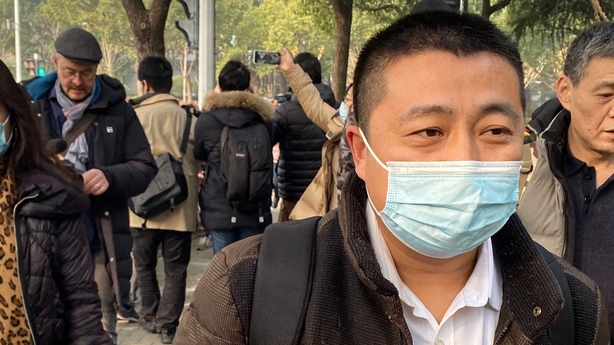A Chinese court has handed a four-year jail term to a citizen-journalist who reported from the central city of Wuhan at the peak of last year's coronavirus outbreak, on grounds of "picking quarrels and provoking trouble," her lawyer said.
Zhang Zhan, 37, was among a handful of people whose first hand accounts from crowded hospitals and empty streets painted a more dire picture of the pandemic epicentre than the official narrative.
"I don't understand. All she did was say a few true words, and for that she got four years," said Shao Wenxia, Zhang's mother, who attended the trial with her husband.
Zhang's lawyer Ren Quanniu told Reuters they "will probably appeal", after the trial at a court in Pudong, a district of the business hub of Shanghai.
"Ms Zhang believes she is being persecuted for exercising her freedom of speech," he had said before the trial.
Critics say that China deliberately arranged for Zhang's trial to take place during the Western holiday season so as to minimise Western attention and scrutiny.
"Beijing's selection of the sleepy period between Christmas and New Year's suggests even it is embarrassed to sentence citizen-journalist Zhang Zhan to four years in prison for having chronicled the uncensored version of the coronavirus outbreak in Wuhan," tweeted Kenneth Roth, the Geneva-based executive director of Human Rights Watch.

Criticism of China's early handling of the crisis has been censored, and whistle-blowers such as doctors warned.
State media have credited the country's success in reining in the virus to the leadership of President Xi Jinping.
The virus has spread worldwide to infect more than 80 million people and kill over 1.76 million, paralysing air travel as nations threw up barriers against it that have disrupted industries and livelihoods.
In Shanghai, police enforced tight security outside the court where the trial opened seven months after Zhang's detention.
Foreign journalists were denied entry to the court "due to the epidemic", court security officials said.
A former lawyer, Zhang arrived in Wuhan on 1 February from her home in Shanghai.
Her short video clips uploaded to YouTube consist of interviews with residents, commentary and footage of a crematorium, train stations, hospitals and the Wuhan Institute of Virology.
Detained in mid-May, she went on a hunger strike in late June, court documents seen by Reuters say.
Her lawyers told the court that police strapped her hands and force-fed her with a tube.
By December, she was suffering headaches, giddiness, stomach ache, low blood pressure and a throat infection.
Requests to the court to release Zhang on bail before the trial and livestream the trial went ignored, her lawyer said.
Other citizen-journalists who had disappeared without explanation included Fang Bin, Chen Qiushi and Li Zehua.
While there has been no news of Fang, Li re-emerged in a YouTube video in April to say he was forcibly quarantined, while Chen, although released, is under surveillance and has not spoken publicly, a friend has said.

